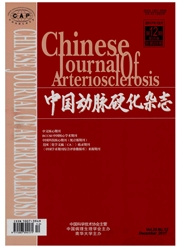

 中文摘要:
中文摘要:
目的研究晚期糖基化终末产物对内皮型一氧化氮合酶的作用,以及雌激素对该作用的影响和具体机制。方法培养人脐静脉内皮细胞,用不同浓度的晚期糖基化终末产物和雌激素进行干预,用W estern b lotting方法检测细胞中内皮型一氧化氮合酶与Akt蛋白质水平的变化。结果晚期糖基化终末产物以不同浓度(50、100和200 mg/L)单独作用于内皮细胞4 h后,内皮型一氧化氮合酶与Akt蛋白质水平明显降低。雌激素以不同浓度(10-9、10-8和10-7mol/L)单独作用于内皮细胞24 h后,内皮型一氧化氮合酶与Akt蛋白质水平均明显增加,而雌激素在10-8mol/L的条件下,晚期糖基化终末产物100 mg/L对内皮型一氧化氮合酶抑制作用明显减弱,且Akt蛋白质水平受到抑制的程度也明显减弱。结论晚期糖基化终末产物对内皮型一氧化氮合酶有显著的抑制作用,雌激素能有效减弱晚期糖基化终末产物的这种作用,这种对内皮型一氧化氮合酶的保护作用可能是通过调节其上游信号分子Akt的蛋白水平而实现的。
 英文摘要:
英文摘要:
Aim To investigate the effects of advanced glycation end-products(AGE) on endothelial nitric oxide synthase type 3(NOS-3) and whether estrogen may influence such effects,then to discover the underlying mechanisms. Methods Cultured human umbilical endothelial cells were administered with different concentrations of AGE and/or estrogen,then western blotting was applied to detect the variation of NOS-3 and Akt protein expression. Results After the administration of AGE(50,100 and 200 mg/L) for 4 h,endothelial cells exhibited lower protein expression of NOS-3 and Akt;after administration of estrogen(10-9,10-8 and 10-7 mol/L),endothelial cells presented higher protein expression of NOS-3 and Akt.Furthermore,with the pretreatment of estrogen(10-8mol/L),the inhibition on NOS-3 protein expression by AGE(100 mg/L) was remarkably ameliorated.As for protein kinase Akt,it demonstrated similar changes. Conclusions AGE could notably suppress the protein expression of NOS-3 in endothelial cells,while estrogen could effectively ameliorate this suppression.The protective effects of estrogen might relate to its positive regulation on the up-stream signaling protein kinase Akt.
 同期刊论文项目
同期刊论文项目
 同项目期刊论文
同项目期刊论文
 期刊信息
期刊信息
